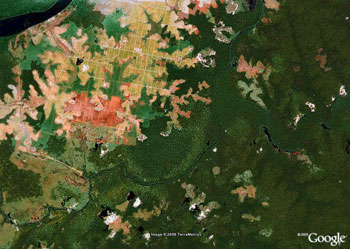Indonesia may seek rainforest conservation compensation to fight global warming
Indonesia may seek rainforest conservation compensation to fight global warming
mongabay.com
November 16, 2006
Indonesia may soon join the Coalition of Rainforest Nations in seeking compensation for rainforest conservation, according to a report from the International Tropical Timber Organization (ITTO), a timber industry group.
ITTO said that Dadang Hilman, a member of the Indonesian delegation at the United Nations Framework Convention on Climate Change (UNFCCC) in Nairobi, Kenya, was considering an invitation to join the coalition, which currently counts 15 member nations. The group, founded by Papua New Guinea, has proposed a rainforest compensation fund financed by industrialized nations seeking to mitigate greenhouse gas emissions. Member countries would be paid based on the amount of deforestation they were able to prevent. The World Bank and the U.N. have recently voiced support for the plan which could potentially bring billions of some of the world’s poorest people while helping to fight climate change and protecting biodiversity.
Indonesia has the world’s second highest annual loss of forest cover after Brazil, but deforestation in the country has a disproportionate impact on global warming due to its peat forests which store large amounts of carbon. By some estimates, the destruction of these ecosystems releases 2 billion metric tons of carbon dioxide a year — about ten percent of world greenhouse gas emissions from human activities. Fires in the peat ecosystems also release a cloud of smoke that causes pollution across southeast Asia.
Deforestation in Indonesia mostly results from agricultural clearing — especially for oil palm plantations — and logging, much of which is illegal.
 Oil palm plantations in and around Tanjung Puting National Park in Kalimantan, Indonesian Borneo Satellite image courtesy of Google Earth. (click image to enlarge) |
RELATED ARTICLES
Avoided deforestation could send $38 billion to third world under global warming pact — 10/31/2006
Avoided deforestation will be a hot point of discussion at next week’s climate meeting in Nairobi, Kenya. Already a coalition of 15 rainforest nations have proposed a plan whereby industrialized nations would pay them to protect their forests to offset greenhouse gas emissions. Meanwhile, last month Brazil — which has the world’s largest extent of tropical rainforests and the world’s highest rate of forest loss — said it promote a similar initiative at the talks. At stake: potentially billions of dollars for developing countries. When trees are cut greenhouse gases are released into the atmosphere — roughly 20 percent of annual emissions of such heat-trapping gases result from deforestation and forest degradation. Avoided deforestation is the concept where countries are paid to prevent deforestation that would otherwise occur. Policymakers and environmentalists alike find the idea attractive because it could help fight climate change at a low cost while improving living standards for some of the world’s poorest people and preserving biodiversity and other ecosystem services. A number of prominent conservation biologists and development agencies including the World Bank and the U.N. have already endorsed the idea.
World Bank says carbon trading will save rainforests — 10/23/2006
Monday the World Bank endorsed carbon trading as a way to save tropical rainforests which are increasingly threatened by logging, agricultural development, subsistence agriculture, and climate change itself. The World Bank report comes on the heels of a proposal by a coalition of developing countries to seek compensation from industrialized countries for conserving their rainforests to fight global warming. Brazil is expected to announce a similar plan at upcoming climate talks in Nairobi.
Developing countries: pay us to save rainforests — 11/27/2005
At this week’s United Nations summit on climate change in Montreal a coalition of tropical developing countries plans to propose that wealthy countries pay them to preserve their rainforests. The group of 10 countries, led by Papua New Guinea and Costa Rica, will argue that they should be compensated for the services rainforests provide the rest of the world.
This article used information from previous mongabay.com articles, a news release from University of Wyoming, and a Reuters report.